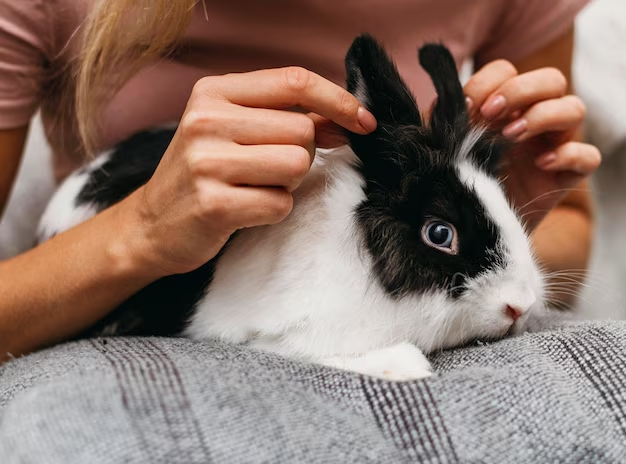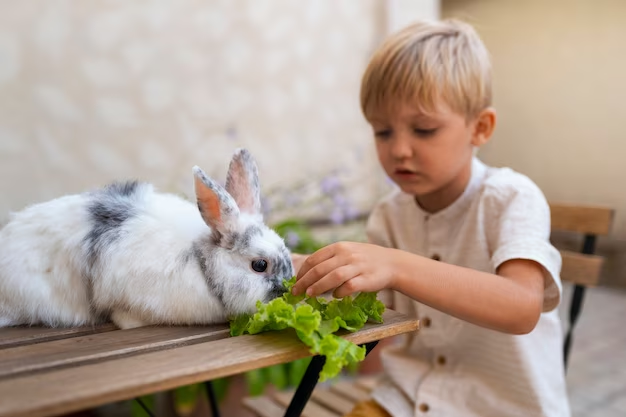When considering a new pet, the question often arises: can you have a bunny as a pet? Rabbits, often overlooked in favor of cats and dogs, have quietly hopped into the hearts of millions, becoming one of the most popular pets worldwide. There’s good reason for this: rabbits offer unique personality traits, form strong bonds with their owners, and can be trained to perform various tricks and tasks. However, potential owners must weigh the pros and cons before bringing a fluffy bunny into their home.
The Joys of Rabbit Ownership
Understanding the benefits is essential before saying “yes” to a floppy-eared friend, especially when determining if are domestic bunnies good pets? Here are several reasons why they can be:
- Companionship and Personality:Rabbits showcase distinct personalities ranging from shy to outgoing. Some may be reserved, needing patience to reveal their true self, while others embrace human interaction eagerly. This becomes particularly crucial when considering which breed of rabbit is most child friendly. Breeds such as the Dutch, Mini Lop, and Rex are known for their gentle and friendly nature, making them ideal choices for families.
- Low Noise Levels:Another advantage, particularly for those living in close quarters, is that rabbits are notably quiet, making them excellent indoor companions. Their serene presence might prompt the question, do rabbits make good indoor pets? Indeed, their subtle communication through gentle thumping or contented purring is far from disruptive, enhancing their suitability for various living environments.
- Space-Efficiency:Rabbits’ minimal space requirements enable them to thrive even in more confined settings, such as apartments. This leads to the consideration of how to take care of a rabbit in an apartment, which involves regular out-of-cage exercise and ensuring their living space is free from hazards.

The Challenges of Rabbit Ownership
Being aware of the particular challenges rabbits present is crucial. They are complex creatures, and not all pet owners are ready for the responsibilities they entail.
- Health Considerations:Rabbits are adept at concealing illnesses, and by the time a problem becomes noticeable, it might be severe. Thus, regular veterinary check-ups, vaccinations, and spay/neuter procedures are indispensable for a rabbit’s health.
- Lifespan and Long-Term Commitment:Rabbits can live for 10 years or more, demanding a long-term commitment from their owners. Prospective rabbit owners must be prepared for this lengthy responsibility, ensuring their fuzzy companions have a secure and loving home throughout their lives.
- Need for Social Interaction:Despite any image of independence, rabbits crave social interaction. Daily engagement with their human family or fellow rabbits is necessary to avert behavioral problems that stem from loneliness.
- Dietary Requirements:A well-balanced diet is a cornerstone of rabbit health. Besides high-quality pellets, a rabbit’s nutrition should primarily consist of hay and fresh vegetables, with ample water always available.
Practical Considerations
Before introducing a rabbit to your family, consider the practical aspects of rabbit care, from their environment to the cost implication of their needs.
- Housing and Space Requirements: NecessityDescription Cage SizeMinimum of 12 square feet FlooringSoft bedding materials AmenitiesSpaces to hide and explore ExerciseDaily activity outside the cage
- Maintenance and Cleaning:Rabbits necessitate a clean habitat to maintain their health, emphasizing the importance of a consistent cleaning schedule.
- Financial Commitment:The financial aspect is often neglected in discussions about pets. Although rabbits are perceived as less costly, they too come with their own set of expenses that should be anticipated and planned for.

Making an Informed Decision
Embarking on the journey of rabbit ownership should be done with careful thought and substantial consideration of one’s current lifestyle and future plans.
- Assessing Lifestyle Compatibility:Prospective rabbit owners should evaluate how a rabbit would fit into their daily routine. If you’re someone with a hectic, unpredictable schedule, finding time for the necessary daily interaction and care might be challenging. Rabbits thrive on routine and stability, so ensuring you can provide that is paramount for their well-being.
- Research and Resourcefulness:Before welcoming a rabbit into your home, gathering a wealth of knowledge about their care is vital. From understanding their unique behaviors to knowing the symptoms of common health issues, being well-informed will make you a more confident and competent rabbit owner.
- The Right Reason for Adoption:It’s important to adopt a rabbit for the right reasons. The novelty of having a cute, furry pet should never overshadow the commitment required to look after them properly. Adopting a rabbit should be a decision based not just on desire, but also on the willingness to provide a lifelong loving home.
Conclusion
Owning a rabbit can bring immeasurable joy, companionship, and laughter into your life. These affectionate creatures have the ability to forge deep bonds with their human families and can offer a unique pet-owning experience compared to more traditional pets. On the flip side, they demand time, dedication, and specific care to ensure they live a happy and healthy life. Potential owners need to weigh the pros and cons meticulously, recognizing the full spectrum of responsibilities that come with having a rabbit as a pet. Appreciating the pleasure and the work involved will help ensure that both you and your rabbit have a rewarding life together.

FAQs
- What is the lifespan of a domestic rabbit?Domestic rabbits typically live between 8 to 12 years when cared for properly, with a diet that meets their nutritional needs, regular veterinary care, and safe living conditions.
- How much space does a rabbit require for a healthy life?A rabbit’s enclosure should be a minimum of 12 square feet, but the more space, the better. Additionally, rabbits need several hours outside their cage each day to exercise and explore in a safe, rabbit-proofed area.
- Can rabbits be litter box trained?Yes, rabbits can be litter box trained with patience and consistency. In fact, they are naturally clean animals and often choose one spot to do their business, which makes litter training more straightforward.
- Are rabbits suitable pets for children?While rabbits are not low-maintenance pets and should not be the sole responsibility of a child, they can be great family pets when adults supervise care and interactions to ensure the safety and well-being of both the child and the rabbit.
- What should I feed my rabbit?A rabbit’s diet should consist mainly of high-quality hay, fresh leafy greens, a small quantity of pellets, and constant access to fresh water. It’s also important to avoid feeding rabbits harmful foods like chocolate, avocado, and sugary treats.
